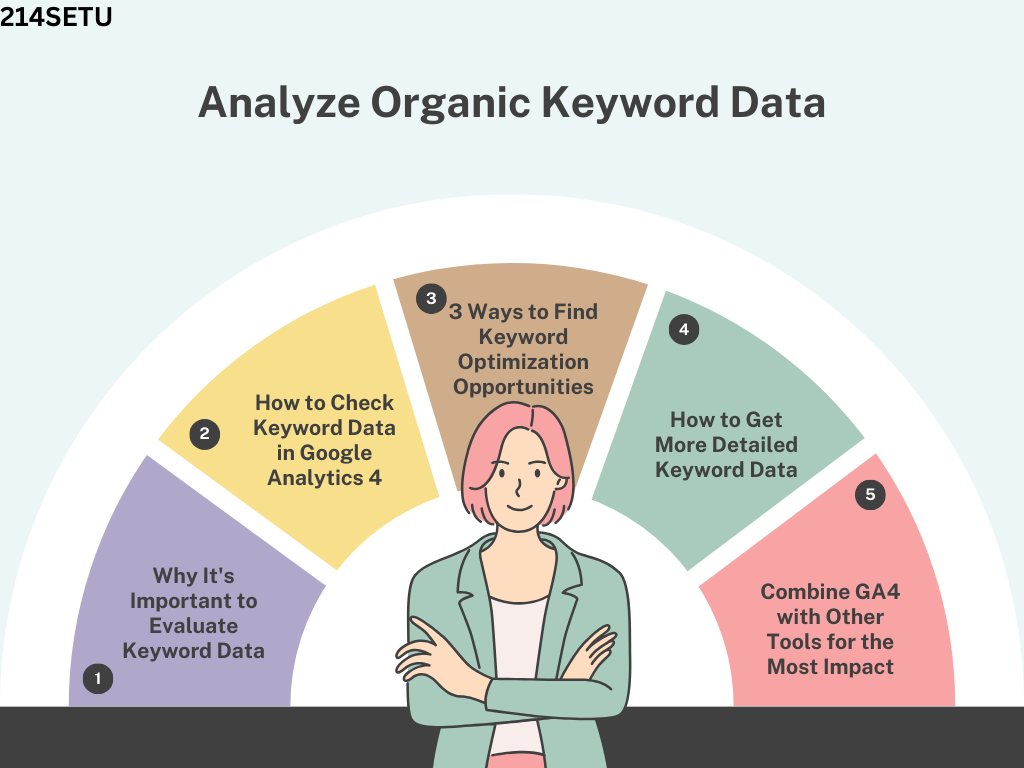
Dive into the nuances of organic keyword analysis in Google Analytics 4 (GA4). Our comprehensive guide walks you through the process of interpreting keyword data, helping you refine your SEO strategy and boost your site’s performance.
The evolution of Google Analytics into its fourth iteration (GA4) brings a new era of insights and opportunities for digital marketers and content creators. Central to understanding and harnessing the potential of your website is the analysis of organic keyword data. This guide is your compass in navigating the GA4 interface, extracting valuable keyword insights, and leveraging this information to supercharge your digital presence.
Why It’s Important to Evaluate Keyword Data
In the digital marketplace, keywords act as the voices of your audience, expressing their desires, questions, and challenges. By evaluating these organic whispers, you gain the ability to:
- Speak Directly to Your Audience’s Needs: Tailor your content to answer the questions your audience is asking.
- Refine Your SEO Strategy: Enhance your website’s visibility and searchability by aligning more closely with search intent.
- Identify New Opportunities: Discover untapped niches or topics that can drive additional traffic and engagement.
Understanding the “why” sets the stage for the “how,” guiding your journey through the analytical landscape of GA4.
How to Check Keyword Data in Google Analytics 4
Transitioning to GA4 might feel like learning a new language. Here’s how to start conversing:
- Navigate to Your GA4 Property: Access your Google Analytics account and select your GA4 property.
- Explore the Reports Section: Click on “Reports” in the navigation menu, then “Acquisition,” and choose “Traffic acquisition.”
- Focus on Organic Traffic: Use filters to isolate organic traffic, identifying the paths users take to find your site.
This initial exploration is just scratching the surface. Next, we delve into optimizing these insights.
3 Ways to Find Keyword Optimization Opportunities
Armed with basic keyword data, turn your attention to optimization. Consider these three strategies:
- Content Gaps and Improvements: Identify high-volume, low-competition keywords that your site currently doesn’t rank well for. These represent opportunities to create new content or improve existing pages.
- User Intent Alignment: Assess whether your content truly matches the intent behind the keywords leading to your site. Adjust your content to better satisfy what users are searching for.
- Performance Monitoring: Regularly review how changes to your content impact your keyword rankings and traffic, adjusting your strategy as needed.
Optimization is an ongoing process of refinement and adaptation. Keep iterating to improve your site’s relevance and authority.
How to Get More Detailed Keyword Data
While GA4 offers robust insights, you might crave deeper dives into keyword analytics. Here’s how to enhance your keyword research:
- Utilize Google Search Console: Integrate GA4 with Google Search Console to access more granular keyword performance data, including click-through rates and positions.
- Advanced Analysis Features: Explore GA4’s advanced analysis options to segment your audience by behavior, demographics, or device, offering a layered view of how different segments interact with your keywords.
These tools and features can reveal the multifaceted story behind your traffic, guiding more informed decisions.
Combine GA4 with Other Tools for the Most Impact
For a panoramic view of your SEO landscape, synergize GA4 with other tools:
- SEO Platforms: Tools like SEMrush or Ahrefs provide additional keyword insights, competitor analysis, and backlink data.
- Google Trends: Pair GA4 data with Google Trends to understand the seasonality of keywords and emerging search patterns.
- Content Optimization Tools: Use tools like Yoast SEO or Clearscope to ensure your content is fully optimized for your target keywords.
Integrating GA4 with a suite of complementary tools equips you with a comprehensive understanding of your digital presence, empowering you to make data-driven decisions that resonate with your audience and amplify your online visibility.
Conclusion: Charting Your Course Through GA4
Mastering organic keyword analysis in GA4 is akin to unlocking a secret garden of insights—each discovery informs the next, leading to a richer, more engaged digital ecosystem. By evaluating keyword data, optimizing your content, and integrating GA4 with other tools, you’re equipped to navigate the digital landscape with confidence and creativity.
Remember, the path to digital mastery is both a science and an art. Keep exploring, keep questioning, and most importantly, keep optimizing. Here’s to your journey through the dynamic world of SEO and beyond, armed with the insights and strategies to thrive in the digital age.SEO Trends in 2024 and How to Adapt and dont worry about the content we have an solution for that also AI Content Creation: A Practical Step-by-Step Guide with ChatGPT

